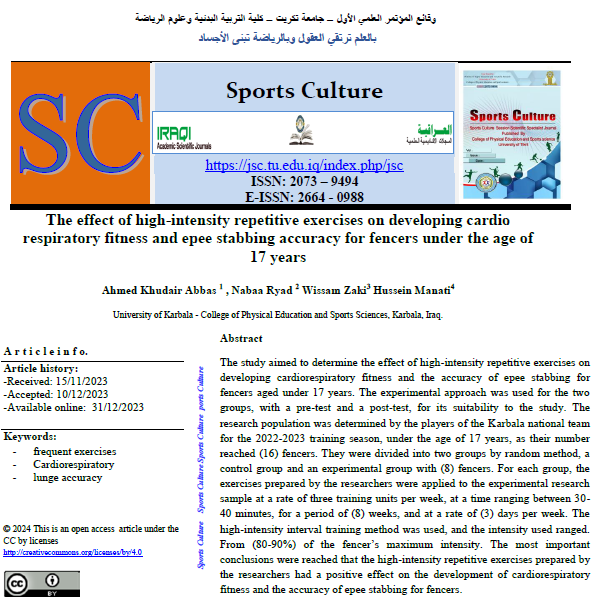The effect of high-intensity repetitive exercises on developing cardio respiratory fitness and epee stabbing accuracy for fencers under the age of 17 years
Main Article Content
Abstract
The study aimed to determine the effect of high-intensity repetitive exercises on developing cardiorespiratory fitness and the accuracy of epee stabbing for fencers aged under 17 years. The experimental approach was used for the two groups, with a pre-test and a post-test, for its suitability to the study. The research population was determined by the players of the Karbala national team for the 2022-2023 training season, under the age of 17 years, as their number reached (16) fencers. They were divided into two groups by random method, a control group and an experimental group with (8) fencers. For each group, the exercises prepared by the researchers were applied to the experimental research sample at a rate of three training units per week, at a time ranging between 30-40 minutes, for a period of (8) weeks, and at a rate of (3) days per week. The high-intensity interval training method was used, and the intensity used ranged. From (80-90%) of the fencer’s maximum intensity. The most important conclusions were reached that the high-intensity repetitive exercises prepared by the researchers had a positive effect on the development of cardiorespiratory fitness and the accuracy of epee stabbing for fencers.
Article Details

This work is licensed under a Creative Commons Attribution 4.0 International License.
Sports Culture (SC) is licensed under the Creative Commons Attribution 4.0 International License, which allows users to copy, create extracts, abstracts, and new works from the article, alter and revise the article, and make commercial use of the article (including reuse and/or resale of the article by commercial entities), provided the user gives appropriate credit (with a link to the formal publication through the relevant DOI), provides a link to the license, indicates if changes were made, and the licensor is not represented as endorsing the use made of the work. The authors hold the copyright for their published work on the TJAS website, while TJAS is responsible for appreciate citation of their work, which is released under CC-BY-4.0, enabling the unrestricted use, distribution, and reproduction of an article in any medium, provided that the original work is properly cited.
